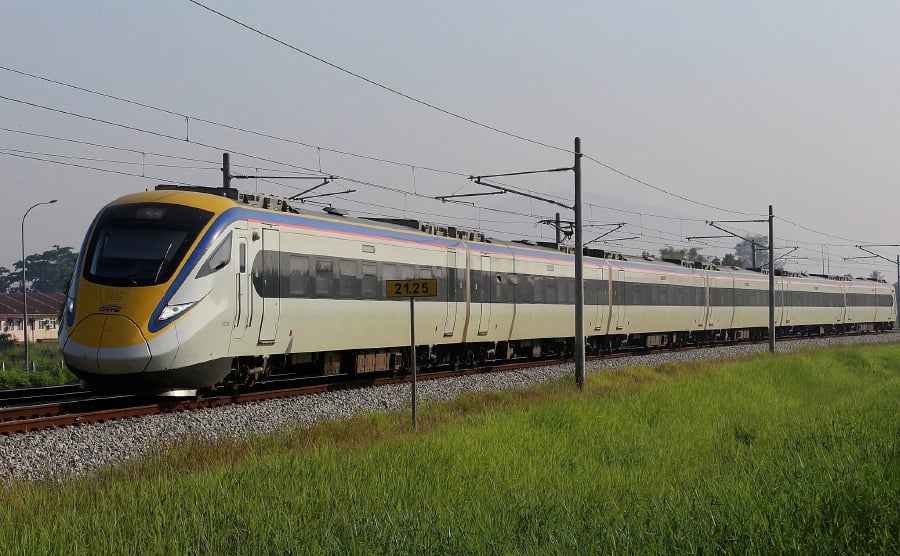KTMB poised to flag first profit

Keretapi Tanah Melayu Bhd (KTMB) chief executive officer Mohd Rani Hisham Samsudin says
KUALA LUMPUR: Keretapi Tanah Melayu Bhd (KTMB), the country’s largest rail service, will finally turn in its first profit after almost two decades of losses, said its new chief executive officer (CEO) Mohd Rani Hisham Samsudin.
KTMB, which has lost almost RM3 billion since it was corporatised in 1992, is expected to declare a net profit for fiscal year 2017, he told NST Business.
He said the major contributor to the profit is passenger ticket sales.
Mohd Rani forecasts that the profitable ETS (electric train service) as well as shuttle services between Johor Baru and Woodlands in Singapore will ensure that KTMB remains profitable year-on-year.
KTMB will also capitalise on the cargo business for growth, he said.
"When I came in to KTMB, I realised what we need to do first is not transformation of the business. It is about the transformation of working culture and attitude.
"KTMB has about 5,700 employees. The first thing we did was to address the union on what they want to do and what we should do. That way, we all understand the health situation of the company and work towards that direction, the division of roles and functions and at the same time having common agenda to develop and grow the company.
"We have to run KTMB as a business entity. There are performance-based KPIs for everyone,” he said.
Mohd Rani said when there are bad apples in the company, those who do not improve will be asked to leave.
“We have to measure and increase the productivity by improving revenue and reducing the cost per employee," he added.
Mohd Rani was appointed KTMB CEO effective September 15, 2017.
A graduate of Northrop University in the United States, Mohd Rani was previously the CEO of KL Airport Services Sdn Bhd (now known as Pos Aviation Services Sdn Bhd) under DRB-Hicom Bhd.
Prior to that, he served as the CEO of Senai Airport Terminal Services Sdn Bhd, and CEO of Johor Port Logistics, both units of MMC Corp Bhd.
Mohd Rani said his first key task when he joined KTMB was to stop the continuous losses in the company.
"It is a challenge to turn around KTMB but I took on the responsible as I believe it can be profitable. Besides engaging with the staff, we have been reviewing all contracts that were outsourced, and looking at the unprofitable routes.
"Either we cut them off our service, or look at other methods to improve passenger volume. This is despite the constraint from the current track rehabilitation under KVDT1 project that limits the frequency of the train and the number of cargo wagons in one rake," Mohd Rani said.
KTMB, owned by the Finance Ministry, has been recording losses since its corporatisation in 1992. It did post net profit of between RM9 million and RM15 million from 1993 to 1995.
The company started to bleed again from 1996 and has been trying for almost two decades to turn around its fortunes. Despite the many changes to its top management and injection of funds by the government, KTMB has been unable to turn around.
An audit conducted in 2011 showed that KTMB incurred RM100 million in losses, which almost tripled to RM280 million in 2012.
In fiscal year 2015, KTMB suffered a net loss of RM226.25 million.
Low fares are among the main contributing factors that have led to KTMB racking up losses. The fares for the commuter service are currently 10.8 sen per kilometre compared with 15 sen per kilometre for LRT services.
Commuter service could break even if it increases the commuter fare by two or three sen per km.
The other main contributing factor was KTMB’s high operational cost in maintaining its rail coaches and infrastructure, plus high electricity and diesel consumption, and manpower costs.
In 2015, employee benefits totalled RM294.5 million, which was 57 per cent of the RM515.8 million revenue the company recorded that year.
It was reported that as a result of the deteriorating conditions of KTMB’s rolling stock, coaches and infrastructure in stretches along the east coast and south, nearly 40 per cent of its operating expenses is spent on manpower costs.
Early last year, the company was considering downsizing its cargo services to cut losses. The cargo services division reportedly incurs losses of about RM55 million per annum.
KTMB former CEO Datuk Sarbini Tijan said early last year that the company was technically bankrupt. He said that for every ringgit the company made, 80 sen went to staff cost.
No comments:
Post a Comment